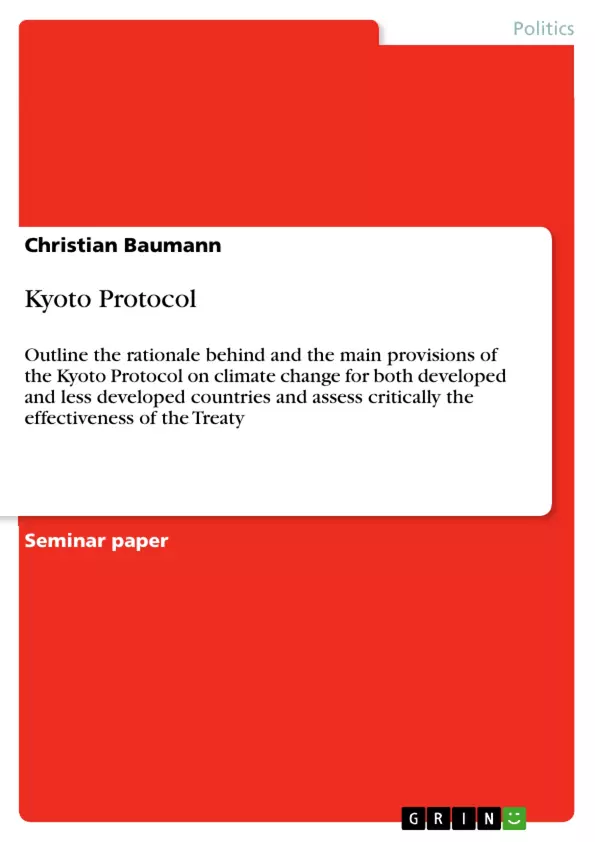For many years scientists alert that a climatic change is taking place which is significantly caused by the way human beings are treating their environment. The negative effects of this development had their origin in the end of the 19th respectively in the beginning of the 20th century when the industrialization in many western countries began. With the industrial progress over the last 100 years an increasingly amount of greenhouse gases is released into the atmosphere causing the ecological balance to become incrementally out of order. The impact can be already felt today as temperatures are rising and this is likely to bring about changes for nature including the human beings and many other species. Although the global climatic change is unlikely to be stopped medium-term because carbon dioxide, the greenhouse gas with the largest quantity in the air, is said to have a 100 years+ lifetime span in atmosphere , the effects of the worldwide warming can be mitigated. In the early 1990’s this environmental issue was picked up and first steps for global climate policies were made. In 1997, the diplomatic efforts led to the resolution of the so called Kyoto protocol which obligates the member states to reduce its greenhouse gas emissions. This result can still today be seen as a milestone in the international climate policy. Therefore, this agreement will be the subject of examination on the following pages. The author will firstly describe the rationale behind the protocol before underlining its main provisions for developed and less developed countries. Moreover, the effectiveness of the treaty will be critically evaluated and finally emphasize will be also given to the impact it has on my home country, Germany.
Table of Contents
- Introduction
- Reasoning for the political action in Kyoto in 1997
- Main declarations on climate change for developed and less developed countries
- Assessment of the effectiveness of the Kyoto protocol
- Strengths
- Weaknesses
- Impact of the Kyoto treaty on Germany
- Conclusion
Objectives and Key Themes
This paper examines the Kyoto Protocol, a landmark agreement aimed at mitigating climate change. It outlines the rationale behind the treaty, its main provisions for both developed and developing countries, and critically evaluates its effectiveness. The impact of the Kyoto protocol on Germany is also discussed.
- The rationale behind the Kyoto Protocol
- The main provisions of the Kyoto Protocol for developed and developing countries
- The effectiveness of the Kyoto Protocol
- The impact of the Kyoto Protocol on Germany
- The role of greenhouse gases in climate change
Chapter Summaries
The first chapter introduces the concept of climate change and its causes, highlighting the role of greenhouse gases. The second chapter explores the reasons for the political action in Kyoto, emphasizing the urgency to address global warming. The third chapter focuses on the main provisions of the Kyoto Protocol, outlining its obligations for both developed and developing countries. The fourth chapter critically evaluates the effectiveness of the protocol, examining its strengths and weaknesses. The fifth chapter discusses the impact of the Kyoto Protocol on Germany.
Keywords
Climate change, Kyoto Protocol, greenhouse gas emissions, developed countries, developing countries, environmental policy, global warming, effectiveness, impact, Germany.
Frequently Asked Questions
What was the primary goal of the Kyoto Protocol?
The goal was to obligate member states to reduce their greenhouse gas emissions to mitigate the effects of global warming.
Why did climate policy become urgent in the early 1990s?
Scientists alerted that industrialization since the late 19th century had released massive amounts of greenhouse gases, disrupting the Earth's ecological balance.
Does the Kyoto Protocol treat all countries the same?
No, it established different provisions and obligations for developed countries versus less developed (developing) countries.
What are the main strengths and weaknesses of the protocol?
A major strength was its status as a international milestone; a weakness was the difficulty in achieving significant global impact without all major emitters fully participating.
How did the Kyoto Protocol impact Germany?
The paper discusses how Germany, as a developed nation, had to implement specific national policies to meet the emission reduction targets set by the treaty.
- Arbeit zitieren
- Christian Baumann (Autor:in), 2009, Kyoto Protocol , München, GRIN Verlag, https://www.grin.com/document/134000



